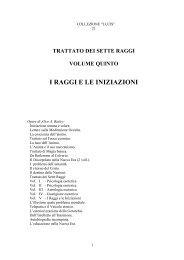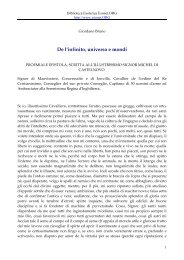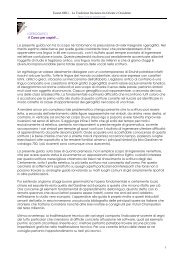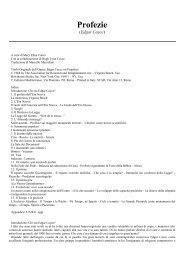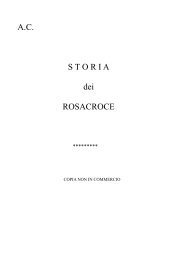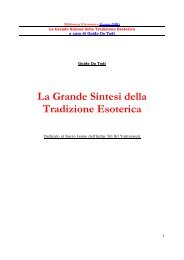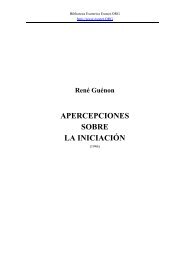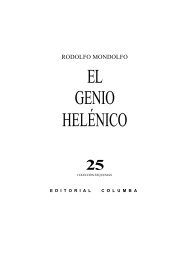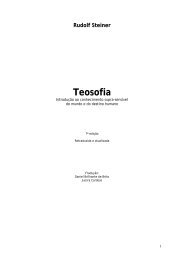Biblioteca Esoterica Esonet.ORG http://www.esonet.ORG 1
Biblioteca Esoterica Esonet.ORG http://www.esonet.ORG 1
Biblioteca Esoterica Esonet.ORG http://www.esonet.ORG 1
You also want an ePaper? Increase the reach of your titles
YUMPU automatically turns print PDFs into web optimized ePapers that Google loves.
Constitution of Man -<br />
The Physical and Psychic Bodies - 3<br />
<strong>Biblioteca</strong> <strong>Esoterica</strong> <strong>Esonet</strong>.<strong>ORG</strong><br />
<strong>http</strong>://<strong>www</strong>.<strong>esonet</strong>.<strong>ORG</strong><br />
The subjective polarity of being in the human body never is and never has been<br />
inoperative. Indeed it is the impersonal and generic power of "life" itself — life as a power<br />
which integrates the multiple elements constituting the entire body. This power is<br />
primarily focused at the etheric levels of the physical body, because these constitute the<br />
field in which structural factors mainly work. These factors — and through them the<br />
formless energy of life (as an agent of the principle of Unity) — need periodic<br />
strengthening. They regularly have to recuperate from the demands made on them by the<br />
principle of Multiplicity during daily activity, when energy is scattered and the human<br />
structure is subject to forces of at least relative "disformation." This recuperation occurs<br />
during sleep.<br />
In sleep, objective consciousness ceases except for the mostly, yet not entirely,<br />
subjective activity we call dreams. In sleep and the dream state, the ratio between the<br />
objective power of the principle of Multiplicity and the subjective power of the principle of<br />
Unity shifts away from the ratio manifesting as the state of waking consciousness. The<br />
new ratio varies during sleep; hence Hindu psychologist-philosophers distinguish the<br />
state of dreaming from that of dreamless sleep. From a practical psychological standpoint,<br />
however, what the awakening consciousness retains as dreams usually are representations<br />
of activities incited by happenings in the sleeping body, of confused remembrances of<br />
events of the preceding days, or symbolic dramatizations (often distorted) of real activities<br />
having occurred at the more "spiritual" levels of a mind controlled by the principle of<br />
Unity.<br />
A dream is the reflection upon the mind of a periodic and only temporary condition of<br />
increased subjectivity that belongs to the realm of objective existence. The death of the<br />
physical body, on the other hand, refers to an alteration of the balance between Unity and<br />
Multiplicity which, though similar to the dream state, is seemingly irreversible. We say<br />
that a person in deep sleep is "dead to the world." But this person awakens, because the<br />
principle of Multiplicity predominates in the world of existence to which the person<br />
belongs as an embodied system of biological organization. When the strength of the<br />
principle of Unity exceeds that of the principle of Multiplicity, the physical body of a<br />
human being not only passes into the state of sleep — it dies. The principle of Unity<br />
becomes too strong to make life in the biosphere possible. Objective existence is "killed" by<br />
too much subjectivity.<br />
The balance between subjectivity and objectivity in a living person is very delicate; it<br />
can differ only slightly from the norm of mankind's evolution at the time the person lives.<br />
Similarly, the temperature of the human body can deviate from the norm of 98.6 degrees<br />
Farenheit (or nearly 37 degrees Centigrade) only plus or minus a very few degrees without<br />
death ensuing. Thus a human being can neither sleep too deeply nor be awake too<br />
objectively. He or she cannot operate too far away from the prevailing normal balance of<br />
subjectivity and objectivity and remain alive in a physical body. The question is, however,<br />
whether during physical life a human being may not have another "body" in which<br />
101



